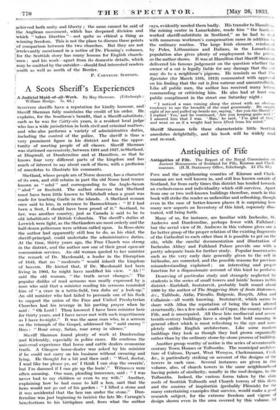A Scots Sheriff's E-xperiences
Scarrisu sheriffs have a reputation for kindly humour, and 1 Sheriff Shennan fully maintains the credit of his order. He explains, for the Southron's benefit, that a Sheriff-substitute,) such as he was for -nifty-six years, is a resident local judge who has a wide jurisdiction inboth civil and criminal matters, and who also performs a variety of administrative duties, including the control of the police. The sheriff is thus a very prominent figure in his district and has the oppor- 1 tunity of meeting people of all classes. Sheriff Shennan was stationed successively, between 1891 and 1927, in Shetland, at Dingwall, at Dunfermline and at Hamilton, so that he' knows four very different parts of the kingdom and has ! much of interest to say about each of them; with a profusion of anecdotes to illustrate his comments.
Shetland, whose people are of Norse descent, has a character of its own, and still retains in-part the old Norse land tenure known as " udul " and corresponding to the Anglo-Saxon " alod " or freehold. The author observes that 'Shetland must have been little known to Whitehall when a grant was made for teaching Gaelic in the islands. A Shetland woman once said to him, in reference to Bannockburn : " If I had been a Scot, I should have been proud of it." Scotland, to her, was another country, just as Canada is said to be to old inhabitants of British Columbia. The sheriff's duties at . Lerwick were light, as the Shetlanders are most orderly and the half-dozen policemen were seldom called upon. In Ross-shire the author had apparently still less to do, as his chief, the , sheriff-principal, could undertake the administrative duties. At the time, thirty years ago, the Free Church was strong in the district, and the author saw one of their great open-air communion services. An old woman quoted to her minister the remark of Dr. Macdonald, a leader in the Disruption of 1843, that no " moderate " would inherit the kingdom of heaven. He -hinted that, if Dr. Macdonald had been living in 1903, he might have modified his view. " Ah ! " said the old woman, " the truth .never changes." The popular dislike of read sermons was neatly expressed by 'a i man who said that a minister reading his sermons reminded him of ".a craw in a tattie-field, twa dubs an' a look-up." An old minister who had failed to persuade one of his flock to support the union of the Free and United Presbyterian Churches had his revenge in his parting prayer when he said : " Oh Lord ! Thou knowest I have been minister here for thirty years, and I have never met with such impertinence as I have to-night." It was the same man who, in a sermon ' on the triumph of the Gospel, addressed the " auld enemy" thus : " Roar away, Satan, roar away in silence."
Sheriff Shennan found plenty of work at Dunfermline and Kirkcaldy, especially in police cases. He confirms the universal experience that horse and cattle dealers economize truth. A Glasgow horse-dealer was asked by his minister ' if he could not carry on his business without swearing and lying. He thought for a bit and then said : " Weel, doctor, I wud like the please ye, an' I think I can stop the sweerin', but I'm damned if I can gie up the leein'." Witnesses were often amusing. One man, pleading innocence, said : " I was , never bad to my children or even to my wife." Another, explaining how he had come to kill a hen, said that the hens would not go out of his garden : " I lifted a stone and it was accidental that the hen ran under the stone." Dun- fermline was just beginning to ieceive the late Mr. Carnegie's benefactions to his birthplace and, from what the author
rays, evidently needed them badly. His transfer to Hamilton, the mining centre in Lanarkshire, made him " the hardeq- worked sheriff-substitute in Scotland," as he had to deal with numerous workmen's compensation cases in addition to the ordinary routine. The large Irish element, reinforced by Poles, Lithuanians and Italians, in the Lanarkshire population also gives plenty of employment to the pollee, as the author shows. It was at Hamilton that Sheriff Shennan delivered his famous judgement on the question' whether the owner of a cat is legally liable for any damage that the cat may do to a neighbotir'spigeons. He reminds us that The Spectator (for March 15th, 1913) commented with approval on his finding that the cat is fera naturae and uncontrollable. Like all public men, the author has received many letters commending or criticizing him. He also had at least one public compliment in the street one Saturday night : " I noticed a man coming along the street with an obvious tendency to use the breadth of the road generously. He caught sight of me and pulled up beside me, saying, ' Are you the Sheriff ? ' I replied Yes,' and he continued, Are you keeping quite well ? ' I assured him that I was. Man,' he said, ' I'm glad of that,' and went on as if a weight had been lifted from his mind."
Sheriff Shennan tells these characteristic little Scottish anecdotes delightfully, and his book will be widely read and re-read. • "
















































 Previous page
Previous page